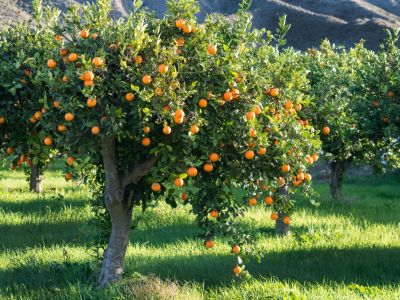How to Grow an Orange Tree
If you’ve not planted an orange tree yet, but are thinking of growing one, you may be thinking of starting one from orange tree seeds. Some orange varieties may come true from seeds, but most often commercial growers use trees that are grafted through a process called budding. Seed grown trees often have a short lifespan, as they are susceptible to foot and root rot. If seed grown trees survive, they do not produce fruit until maturity, which can take up to 15 years. Consequently, growing seedlings are best used as the scion of a graft union between them and a rootstock that tolerates adverse growing conditions. Fruit is produced from the scion and develops more quickly on grafted trees than on trees grown from orange tree seeds. In areas where oranges grow, local nurseries may be the best place to purchase a grafted tree.
Taking Care of an Orange Tree
If you are taking care of an orange tree that is already established, you may have questions about three important aspects of orange tree care: fertilizing, watering, and pruning.
Water– Water needed for growing orange trees varies by climate and yearly rainfall totals, but as a rule of thumb, orange tree care involves regular watering in spring to prevent wilting and withholding of irrigation in fall. When taking care of an orange tree, remember that water lowers the solid content of the fruit. Depth of planting also affects how much water you provide during orange tree care. Growing orange trees usually need between 1 and 1 ½ inches (2.5-4 cm.) of water per week. Fertilization– Fertilization of growing orange trees depends on the use of the fruit. Extra nitrogen fertilizer results in more oil in the peel. Potassium fertilizer decreases oil in the peel. For high productivity of edible oranges, 1 to 2 pounds (0.5-1 kg.) of nitrogen should be applied yearly to each tree. Fertilizer should include potassium and phosphorus as well as a range of micro-nutrients. If your older orange tree does not produce fruit in abundance, take a soil test of the area where growing orange trees reside to determine what fertilizer ratio is needed. Additional fertilization is often applied by spraying the leaves of the tree once or twice a year. Pruning– Pruning the orange tree for shape is not necessary. However, you should remove any branches that are a foot (31 cm.) or less from the ground. In addition, remove damaged or dying branches once they are noticed.
